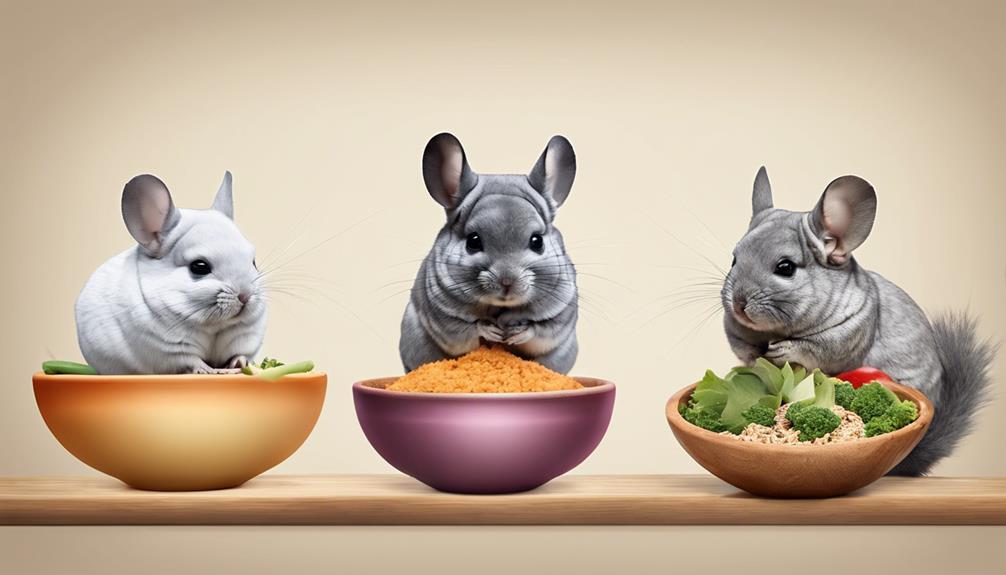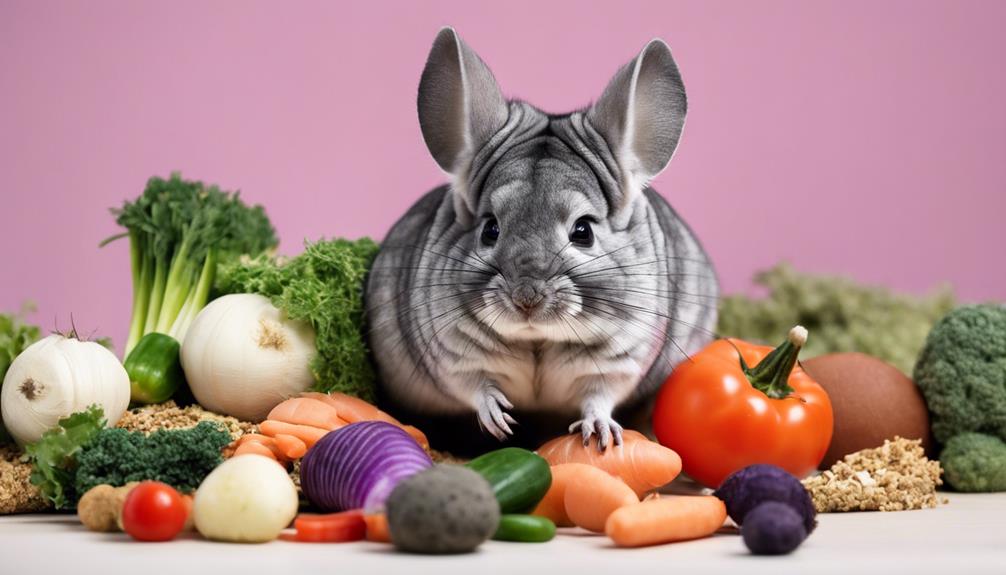How Age Affects Chinchilla Diet: Adjusting for Life Stages

Chinchillas have specific dietary needs that vary depending on their life stage.
Providing the right nutrition can support their health and longevity.
Understanding these essential nutritional adjustments is crucial for chinchilla owners.
It is important to tailor their diet according to their age and specific requirements.
By providing a balanced and appropriate diet, chinchilla owners can help ensure their pets lead a healthy and fulfilling life.
Nutritional Needs of Baby Chinchillas
When caring for baby chinchillas, it's paramount to understand their unique nutritional needs to guarantee ideal growth and development. The weaning process is a critical stage during which baby chinchillas shift from solely relying on their mother's milk to starting solids. This change is essential for their development as it introduces them to a more varied diet essential for their growth.
During this weaning process, providing a balanced diet rich in hay, pellets, and fresh vegetables is important. These foods not only support their growth but also aid in developing their digestive system, ensuring they can effectively absorb nutrients. Additionally, offering timothy hay can help wear down their teeth, which continually grow.
To promote ideal growth, it's essential to monitor their food intake and adjust the quantities as needed. By paying close attention to their nutritional requirements during this formative stage, you set a strong foundation for their overall health and well-being as they mature into adolescence.
Feeding Adolescents: Growth Requirements
To guarantee the prime growth and development of adolescent chinchillas, it's important to comprehend and meet their specific nutritional requirements during this pivotal stage. As these young chinchillas shift from infancy into adolescence, their bodies undergo rapid growth and development, necessitating a diet rich in essential nutrients to support this phase. Understanding the distinct growth stages of adolescent chinchillas is key in providing them with the appropriate dietary supplements needed to thrive.
During this period, adolescent chinchillas have increased energy requirements to support their growth spurts and overall development. It's important to provide them with a balanced diet that includes high-quality hay, pellets, fresh water, and occasional treats. Additionally, dietary supplements such as vitamin C may be beneficial in ensuring prime health during this critical stage.
Adult Chinchillas: Maintaining Optimal Health

For adult chinchillas to maintain excellent health, it is imperative to provide a balanced diet that meets their specific nutritional needs at this stage of life. Ensuring their diet includes a proper nutritional balance is essential for their overall well-being. Here is a table outlining key aspects to consider in maintaining your adult chinchilla's health:
| Aspect | Importance | Tips |
|---|---|---|
| High-Quality Hay | Essential for digestion and dental health | Provide unlimited access to grass hay |
| Pellets | Balanced nutrients and fiber | Offer high-quality pellets in moderation |
| Fresh Water | Hydration and overall health | Ensure a fresh water source is always available |
To further enhance their health, consider incorporating dietary supplements recommended by a veterinarian to address specific needs. By focusing on these aspects and providing a diet tailored to your adult chinchilla, you can help them thrive and lead a healthy life. Remember, their well-being is paramount, and your efforts in maintaining their health are truly commendable.
Pregnancy and Lactation: Special Considerations
During pregnancy and lactation, your chinchilla's nutrient needs will increase to support the growing offspring and milk production. Ensuring a diet rich in essential nutrients and vitamins is important for both the mother and her young.
After giving birth, adjustments to the diet may be necessary to promote best postpartum health.
Nutrient Needs During Pregnancy
Ensuring high-quality nutrient intake is essential during the phases of pregnancy and lactation, offering a foundation for both maternal health and offspring development. Prenatal nutrition plays an important role in meeting gestational requirements, supporting the chinchilla mother's health and the growth of her young.
A well-balanced pregnancy diet is essential for best maternal health, ensuring that the mother chinchilla receives the necessary nutrients to sustain herself and her developing litter. Adequate maternal nutrition during pregnancy not only impacts the mother's well-being but also influences the health and vitality of the newborn chinchillas.
Hence, paying close attention to the specific dietary needs during pregnancy is fundamental for a successful reproduction process and the overall well-being of the chinchilla family.
Supporting Milk Production
To optimize milk production during pregnancy and lactation, chinchilla mothers must prioritize a nutrient-rich diet tailored to their specific needs. Age-related nutritional needs play a critical role in ensuring adequate support for lactation. By making dietary adjustments that account for the increased demands of milk production, chinchilla mothers can provide the essential nutrients required for the health and growth of their offspring.
Focusing on quality hay, fresh water, and specially formulated pellets rich in fiber, protein, and essential vitamins and minerals can aid in supporting milk production. Additionally, offering occasional treats such as dried fruits or herbs can provide variety and additional nutrients. By understanding the importance of tailored nutrition, chinchilla mothers can effectively support their young during this critical stage of development.
Postpartum Diet Adjustments
Adjusting your diet postpartum is important to make sure that you continue to provide excellent nutrition for both yourself and your nursing chinchilla offspring.
During postpartum recovery, your body requires specific nutrients to replenish what was lost during pregnancy and childbirth. Ensuring adequate maternal nutrition is critical for promoting healing and sustaining milk production.
Focus on consuming foods rich in calcium, protein, and fiber to support your recovery process and maintain best health for both you and your chinchilla babies. Remember to stay hydrated and incorporate a variety of nutrient-dense foods into your diet to meet the increased demands of lactation.
Prioritizing your well-being through proper postpartum nutrition sets the foundation for a healthy start for you and your precious chinchilla offspring.
Senior Chinchillas: Adjusting for Aging
As your chinchilla ages, their dietary needs may change, requiring adjustments to guarantee their health and well-being.
Senior chinchillas may benefit from modifications to their diet to accommodate age-related changes and promote longevity.
Considering the specific nutritional requirements of older chinchillas is vital for maintaining their quality of life.
Senior Dietary Changes
In the golden years of a chinchilla's life, dietary adjustments become important to guarantee their health and well-being. Senior chinchilla care involves understanding the aging chinchilla's nutrition and special needs.
As chinchillas age, their metabolism slows, making it important to adjust their diet accordingly. Senior chinchillas may require softer foods to aid digestion and prevent dental issues. Introducing more hay into their diet can help with digestion and provide essential fiber. Additionally, increasing their vitamin and mineral intake can support their aging immune system and overall health.
Monitoring their weight and energy levels is essential to make sure they're receiving adequate nutrition. By adapting their diet to their changing needs, you can help your senior chinchilla lead a healthy and comfortable life.
Health Considerations for Seniors
To guarantee the well-being and vitality of your aging chinchilla, it's essential to carefully consider their health needs as they enter their senior years. As your chinchilla ages, there are specific health considerations you should keep in mind:
- Ensuring Obesity: Senior chinchillas may have a slower metabolism, making them more prone to obesity. Vital their diet is adjusted to prevent excess weight gain.
- Dietary Modifications: With age, chinchillas may require dietary modifications to accommodate changing nutritional needs. Consult with a veterinarian to tailor their diet accordingly.
- Regular Veterinary Check-ups: Regular check-ups become increasingly important as chinchillas age. Detecting and addressing health issues early can improve their quality of life.
Health Issues: Dietary Solutions

Implementing tailored dietary adjustments can effectively address various health issues that may arise in different life stages of chinchillas. When it comes to digestive issues, dietary solutions play a vital role in maintaining your chinchilla's well-being. For digestive problems such as bloating or diarrhea, adjusting their diet by increasing hay and reducing sugary treats can help regulate their digestion. Additionally, ensuring a proper balance of fiber-rich foods can aid in preventing gastrointestinal discomfort.
For weight management, nutritional strategies are essential. Chinchillas, like humans, can struggle with weight gain or loss. To combat obesity, focusing on a diet rich in high-quality hay, limited pellets, and fresh vegetables can assist in weight control. Conversely, if your chinchilla is underweight, incorporating more calorie-dense foods like alfalfa hay and treats can help them gain the necessary weight.
| Health Issue | Dietary Solution |
|---|---|
| Digestive Issues | Increase hay, reduce sugary treats, maintain fiber balance |
| Weight Management | Focus on high-quality hay, limit pellets, add fresh vegetables for weight control |
| Introduce calorie-dense foods like alfalfa hay and treats for underweight chinchillas |
Supplements for All Life Stages
When considering the supreme health of your chinchilla through all life stages, what essential role do supplements play in their overall well-being? Dietary supplements are vital for maintaining the vitality and longevity of your beloved chinchilla. These supplements offer a myriad of health benefits, ensuring that your pet receives the necessary nutrients to thrive. Whether your chinchilla is young, adult, or entering its golden years, incorporating supplements into their diet can make a significant difference in their well-being.
- Enhanced Nutrient Absorption: Supplements aid in improving nutrient absorption, especially in aging chinchillas whose digestive systems may not function as efficiently.
- Supporting Joint Health: Certain supplements can help support joint health, which is particularly important for older chinchillas experiencing stiffness or arthritis.
- Boosting Immune System: Supplements can boost the immune system, helping your chinchilla ward off illnesses and stay strong throughout its life stages.
Frequently Asked Questions
Can Chinchillas Eat Fruits and Vegetables at Any Stage of Life?
Chinchillas can enjoy fruits and vegetables throughout their lives, but it's important to balance these treats with their nutritional requirements. As they age, consider their changing needs and adjust their diet accordingly for best health.
How Often Should I Change My Chinchilla's Diet Based on Its Age?
In the delicate dance of life, your chinchilla's dietary rhythm must harmonize with its growth stage. Consider the feeding frequency and nutritional requirements as you make dietary adjustments to cater to your pet's evolving needs.
Are There Any Specific Foods That Should Be Avoided for Chinchillas of Certain Ages?
Avoid certain foods based on age. Nutritional requirements vary, toxic foods exist. Consider dietary restrictions during different growth stages. Stay mindful of what's safe for your chinchilla at each life phase to guarantee health.
How Can I Tell if My Chinchilla Is Getting Enough Nutrients in Its Diet?
To guarantee your chinchilla is receiving adequate nutrients in its diet, monitor for signs of nutrient deficiencies like dull fur or weight loss. A balanced diet will reflect in their health indicators, showing vitality and well-being.
Is It Necessary to Provide Different Types of Hay for Chinchillas at Different Life Stages?
To guarantee top-notch health for your chinchilla, providing various hay types based on life stages is crucial. Nutritional balance and age influence their dietary needs. Supplementing with suitable options promotes well-being and longevity.











